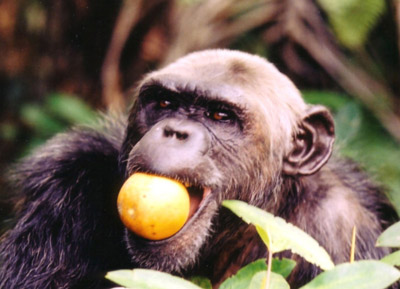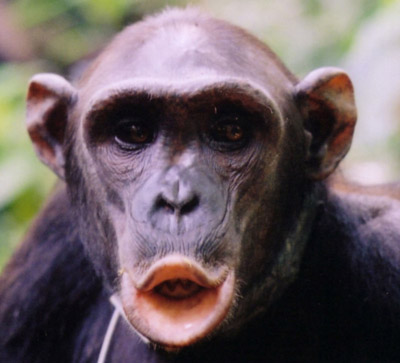|
programmehabitat
Home
> H.E.L.P. Project > Part
"Freedom of the primates"
••Our actions in favour of the freedom
of the primates
H.E.L.P.
Project, apart from its part
"Habitat
of the primates", takes important actions in favour in order to keep the
primates in freedom. These actions concern in particular the
chimpanzee. These actions are in the heart of the programs of the
H.E.L.P. Project since its creation and the results obtained are at the origin
of the recognition of this project at the international level. This part "Freedom
of the primates" touches three fields: the reception of orphan chimpanzees,
anti-poaching and the reintroduction in natural environment of ex-captive chimpanzees.
The reception of orphan chimpanzees
ø
With the development
of the poaching, many babies chimpanzees found themselves orphan and
sold, primarily like pets. Several sanctuaries were created through Africa to
accomodate them, because often these animals are given up or seized by the authorities
(see also "Conservation").
 øAliette
Jamart started to collect chimpanzees in 1989. But upon the begining, its action
was distinguished: "not of cage at my home !" øAliette
Jamart started to collect chimpanzees in 1989. But upon the begining, its action
was distinguished: "not of cage at my home !"
Indeed, the chimpanzees accomodated in Pointe Noire between 1989 and 1991
lived in a large building opening on the outside. The babies lived together
there.
When Aliette Jamart thought for a place to accomodate its protected under better
conditions, she thought for a site with wooded islands: there too, no question
of cage. Thus the choice was made on the islands of the lagoon of Conkouati
and that in 1991 the
Sanctuary of Conkouati was created.
More than 70 chimpanzees were accomodated by H.E.L.P. Congo between 1989 and
2005. But majorty of them arrived at H.E.L.P. Congo between 1989 and 1994. After
this date, the reception of new babies was not any more a priority: the means
were concentrated on the program of reintroduction, the sanctuary being in extreme
limit of its capacity of reception.
ø
The accomodated chimpanzees
were in majority young individuals, sometimes less than one year old, seized
by the Congolese authorities or abandoned by private individuals. But some
of the chimpanzees arrived older, often resulting from the zoos of Pointe
Noire and especially of Brazzaville, due to the civil war. The oldest one were
accomodated on one of the islands of the Sanctuary. For the younger, it was
often necessary to look after them and wean them (stay at the nursery),
before planning to put them on one of the islands of the Sanctuary. 
ø At
the beginning of 2006, two of the three islands are still inhabited by
chimpanzees. They often find what to eat on their island but it is way
too insufficient. Also, on a daily basis, it is brought to
them fruits and a complement containing cereals and milk. The
majority of these individuals cannot be released in total in
freedom, much being too old or handicapped.
ø In the future, the H.E.L.P. Project will start maybe again its effort of reception. That will depend if a
new program of reintroduction is developed. Because to accomodate chimpanzees in
a sanctuary is not enough, it is necessary to ensure a future for them, in
freedom!
Anti-poaching
The anti-poaching is essential to
limit the traffic of wild animals, especially killed for the consumption of
the meat, resold on Pointe Noire. At this level, the H.E.L.P. Project acts in two
ways:
- in support of the Congolese authorities, by accomodating
chimpanzees which they seize, and bringing, if needed and according
to our means, a support, primarily logistic, with the teams of active eco-guards
on the National Park of Conkouati-Douli ;
- while
dissuading, by the simple permanent presence of our teams in forest, the
poachers who were very active on the Triangle, site of our reintroductions, and the zones of
contiguous forests. Indeed, since we are present on these sites (since 1996),
the poaching strongly decreased and wild fauna came back in number. Thus, the
observations of wild animals are in progression, in particular elephants, cercopitheques, buffalos or felines.

Our program of reintroduction
ø
Begun in 1996 on the site of the Triangle, forest
belt bordering the lagoon of Conkoauti and included in the national park of
Conkouati-Douli, this program made it possible the released in natural
environment of 40 individuals in 10 years. For more informations, click on our program of reintroduction / Conservation.
ø The serious of our
program, success obtained made it possible for the H.E.L.P. Project to be recognized by
the whole of the primatologists. We make a point to this date, several program
of reintroduction of chimpanzees are being studied in various countries of
Africa. We hope to contribute to it by our expertise. And today in 2006,
we study the feasibility of a new program of reintroduction, on another site.

|

